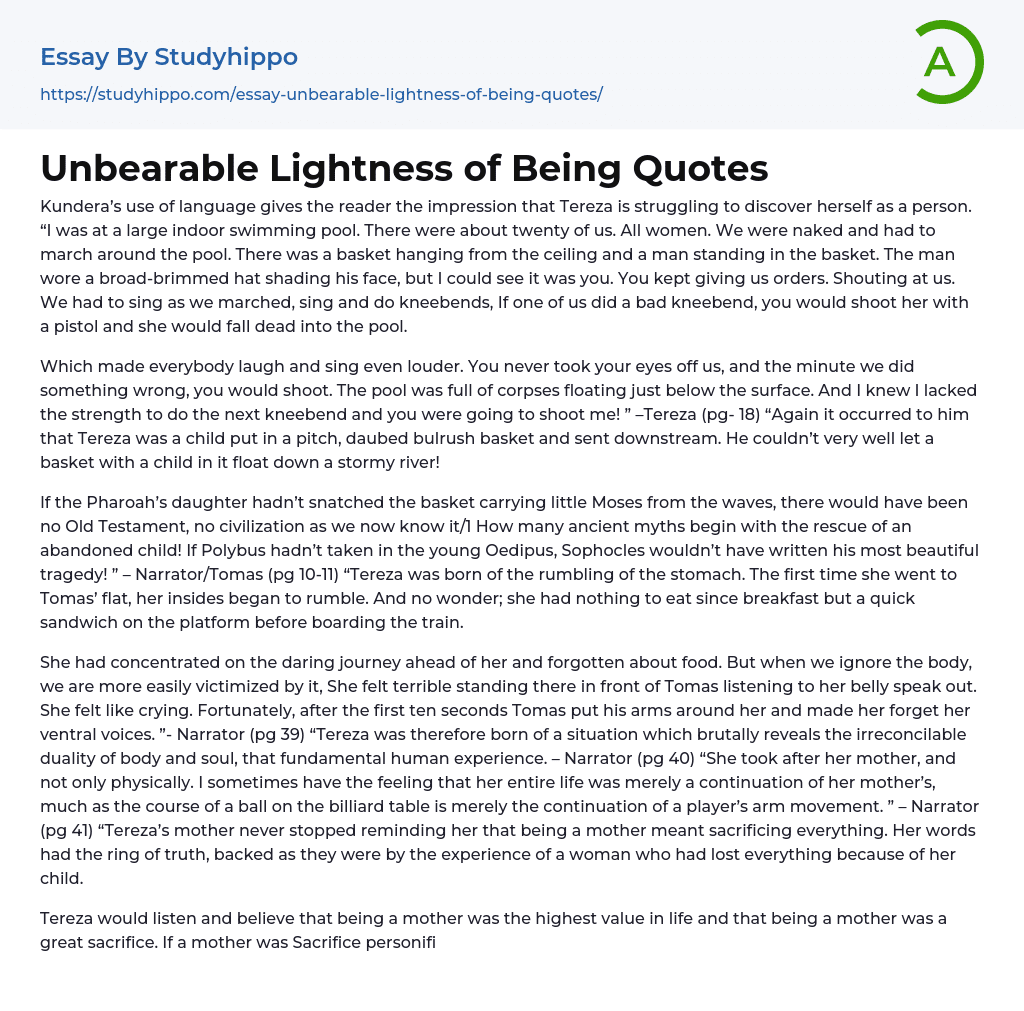Kundera uses language to depict Tereza's process of self-discovery in the text. The narrator depicts a scene in which Tereza discovers herself in a large indoor swimming pool, enclosed by approximately twenty women.
While wearing a broad-brimmed hat to shade your face, you were the man standing in a basket that hung from the ceiling and continued to give us orders as we marched around the pool, naked.
While marching, we were constantly shouted at and had to sing. We also had to do kneebends. If any of us performed a bad kneebend, you would shoot her with a pistol. The girl would then fall dead into the pool, which caused everyone to laugh and sing even louder. Your watchful eyes never left us, and the moment we made a mistake, you would shoot.
The pool was fille
...d with corpses floating just below the surface. And I realized that I didn't have the strength to do the next kneebend, and you were going to shoot me!" - Tereza (pg- 18)
"Once again it occurred to him that Tereza was like a child placed in a woven bulrush basket and sent downstream. He couldn't just let a basket with a child float down a stormy river! If the Pharaoh's daughter hadn't saved the basket carrying little Moses from the waves, there would be no Old Testament, no civilization as we know it. How many ancient myths begin with the rescue of an abandoned child! If Polybus hadn't taken in young Oedipus, Sophocles wouldn't have written his most beautiful tragedy!" - Narrator/Tomas (pg 10-11)
"Tereza was born out of hunger. The first time she went to Tomas' apartment, her stomac
started rumbling. And it's no wonder; she hadn't eaten anything since breakfast besides a quick sandwich on the platform before boarding the train.
The narrator says that the protagonist had been focused on the risky journey she had ahead and had not thought about eating. However, when people disregard their bodies, they become more susceptible to its demands. She felt awful standing in front of Tomas as her stomach audibly expressed its hunger. She wanted to cry. Thankfully, after ten seconds, Tomas embraced her and helped her ignore the noises coming from her abdomen. The narrator suggests that Tereza's birth was a result of a situation that starkly exposes the incongruity between the body and soul, which is a fundamental experience for humans.
The narrator on page 40 expresses that Tereza took after her mother not only physically but also in the way she lived her life. The narrator compares Tereza's life to the movement of a ball on a billiard table being a continuation of a player's arm movement. On page 41, the narrator continues to highlight the influence of Tereza's mother, who constantly reminded her daughter that being a mother meant sacrificing everything. The narrator acknowledges the truth in these words, as they are supported by the firsthand experience of a woman who lost everything because of her child.
According to the narrator, Tereza's views on motherhood and the sacrifices it entails are highlighted on page 44. The narrator also presents Tereza as embodying her mother's decision to let go of her youthfulness. Moreover, on page 46, the narrator indicates that Tereza's behaviors and gestures resemble those of her extravagant and self-destructive mother. This explains
why Tereza often looks at herself in the mirror; it is a way for her to confront how her mother influenced her.
On page 47, the narrator expresses a longing for a unique and soulful body, one where the face reflects the depth of the soul. However, Tereza faces difficulty in achieving this as her timid and self-effacing soul remains hidden within her bowels, too ashamed to be seen. Despite this, books serve as a source of comfort for Tereza, symbolizing a secret brotherhood. They become her only weapon against the crude world that surrounds her. Novels specifically play a significant role in providing not just an imaginary escape from her dissatisfying life but also hold physical significance. Tereza takes pleasure in carrying a book under her arm while walking down the street.
According to the narrator on page 48, the significance of having an elegant cane for the dandy a century ago is comparable to how it differentiates her from others. On page 60, the narrator describes how in moments of weakness, she is willing to let go of her soul's crew and join her mother's friends. She also has a desire to do something that would prevent her from going back to Tomas.
On page 76, the narrator expresses a strong desire to brutally erase the past seven years of their life. They describe this feeling as vertigo, an overwhelming and irresistible urge to fall.
- Gesture essays
- Adoption essays
- Aunt essays
- Babies essays
- Bedroom essays
- Caring essays
- Children essays
- Daughter essays
- Divorce essays
- Dog essays
- Dysfunctional Family essays
- Family Tradition essays
- Family Values essays
- Father essays
- Foster Care essays
- Friends essays
- Grandparent essays
- Home essays
- Hometown essays
- Husband essays
- Jealousy essays
- Love essays
- Marriage essays
- Mother essays
- Online Dating essays
- Parenting essays
- Parenting Teens essays
- Parents essays
- Relationship essays
- Room essays
- Sibling essays
- Sister essays
- Wedding essays
- Wife essays




